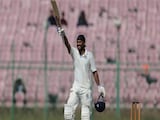The top politician in Australia's Northern Territory said Tuesday it was "time to consider" a return to crocodile culling after an attack at a popular swimming spot.
A 67-year-old man is recovering in hospital after encountering a crocodile at Wangi Falls in Litchfield National Park on Monday.
Northern Territory chief minister Natasha Fyles told reporters there had been a "significant increase" in the crocodile population since culling was suspended in the 1970s, with numbers going from around 3,000 to an estimate of more than 100,000.
"I think it's time for us to consider: do we need to go back to culling, considering that significant increase in the crocodile population and the impact it's having not only on tourism and visitors, but locals," she said.
Rangers and a crocodile management team had euthanised a 2.4-metre (nearly eight-foot) male saltwater crocodile at Wangi Falls on Monday night, according to the Department of Environment, Parks and Water Security.
Litchfield National Park is in a so-called barrier and removal zone, meaning that there is a "zero tolerance" approach to crocodiles and they can be trapped.
Northern Territory figures show that there were no saltwater crocodiles caught in Litchfield last year, but four were caught in each of the previous two years.
The swimming area where the man was attacked remains closed and will not reopen until surveys show it is safe.
Fyles described Monday's attack as "extremely scary", adding: "We do need to consider the measures that we have to keep our community safe."
Latest government statistics show that tourism was worth Aus$1.7 billion (US$1.14 billion) to the Northern Territory economy, although this figure was from 2021/22 when international travel was still recovering from the Covid-19 pandemic.
Asked about the impact of the attacks on tourism, Fyles said: "I think everyone in the territory has stories where crocodiles have been more aggressive, have interacted, and when you have a bigger crocodile population, there is more chance that they will interact with humans.
"I think we had a very thankful outcome yesterday but it could be more tragic into the future."
(Except for the headline, this story has not been edited by NDTV staff and is published from a syndicated feed.)














